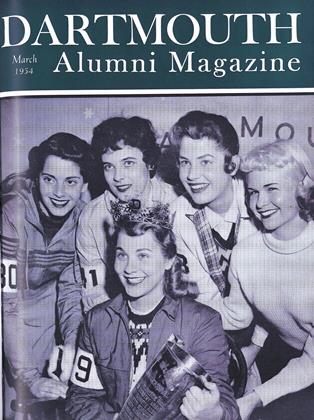AN experiment in education, with better teaching as its goal, is taking place this year at Dartmouth and at thirteen other institutions.
At the College, six promising young instructors, all beginning their teaching careers, are working as Educational Interns under a grant from the Fund for the Advancement of Education. established by the Ford Foundation.
The program has now been in operation for one semester, and the consensus among Dartmouth professors connected with it is that it has exciting possibilities - for both the interns and the College. It has already attracted other young faculty members, not interns, who have associated themselves with the group on an informal basis.
The Educational Interns, holding the faculty rank of Instructor in six different departments - Art, Botany, Classics, Government, History and Psychology — are interns in the true sense of the word. As the program operates at Dartmouth, their positions are similar to those of medical or surgical interns in a hospital. The interns are assigned to older, experienced teachers in their respective departments; and in addition, they have a seminar of their own which meets each week, under the chairmanship of Arthur M. Wilson, Professor of Biography and Government.
Besides the supervised teaching of regular classes and seminars, each intern also serves as a counselor for a small group of students on academic probation. It was felt that the best method of giving the interns first-hand experience with some of the problems that face college undergraduates was to throw them immediately into a close, professional relationship with students who have real academic problems. In this part of their teacher training, the interns work closely with the Office of Student Counseling, which provides supervision and guidance.
"The combination of internship, departmental guidance and special seminar," says Professor Wilson, "constitutes one of the most exciting things to happen in years on the campuses of American colleges. This is a technique that we could conceivably broaden out for all teachers." It is his opinion that this effort to formalize the professional relationship between the experienced and the beginning teacher is bound to have - in fact, is already having - a significant effect.
Multiplied in scope, if the national experiment of Educational Interns is deemed a success, the Ford Foundation program can have the effect on college teaching that internships already have in promoting the "art" of the profession in medicine, law and religion. Dartmouth's part in the experiment for better teaching may have lasting benefit on teaching as a profession, on the recruitment of outstanding young men and women as teachers, and, most important, on the thousands of students who will be taught by these interns in the years to come.
Teaching interns at Dartmouth at their weekly seminar with Prof. Arthur M. Wilson, chairman. L to r: Tewfik A. Toussoun, Botany; S. Frederic Wiil Jr., Classics; Professor Wilson; William F. John, Psychology; Richard E. Wagner, Art; David B. Davis '50, History; Andrew M. Scott '45, Government.
 View Full Issue
View Full Issue
More From This Issue
-
 Feature
FeatureHow Much Government?
March 1954 By LAURENCE I. RADWAY -
 Feature
FeatureIn the Public Eye
March 1954 By FRANCIS BROWN '25, -
 Class Notes
Class Notes1929
March 1954 By F. WILLIAM ANDRES, EDWIN C. CHINLUND -
 Class Notes
Class Notes1918
March 1954 By ERNEST H. EARLEY, W. CURTIS GLOVER, RICHARD P. WHITE -
 Class Notes
Class Notes1926
March 1954 By HERBERT H. HARWOOD, H. DONALD NORSTRAND, CARLETON BLUNT -
 Class Notes
Class Notes1952
March 1954 By LT. (JC) ROBERT D. BRACE, ENS. DONALD E. MACLEOD







